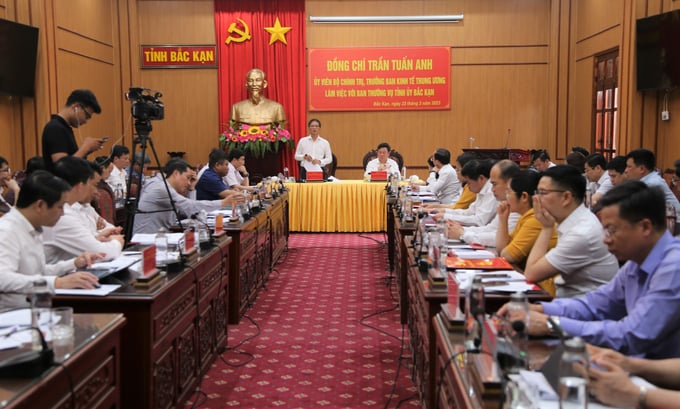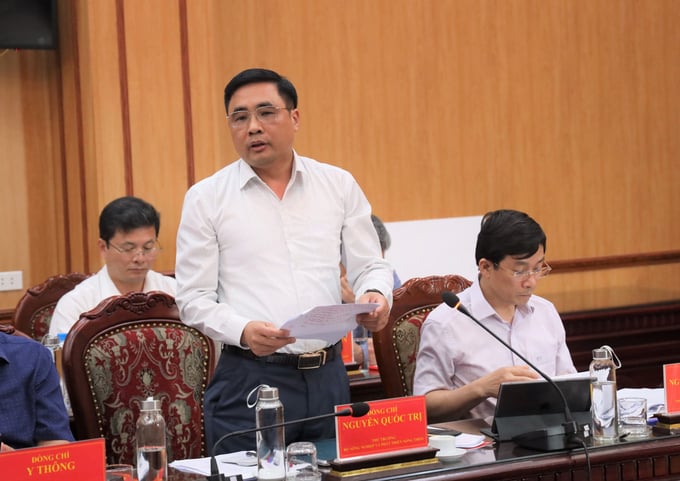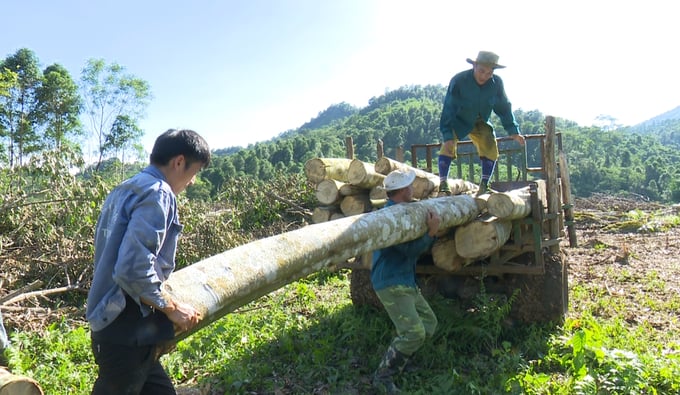May 16, 2025 | 10:06 GMT +7
May 16, 2025 | 10:06 GMT +7
Hotline: 0913.378.918
May 16, 2025 | 10:06 GMT +7
Hotline: 0913.378.918
On March 23, Mr. Tran Tuan Anh, Politburo member, Head of the Central Economic Commission had a working session with the Standing Board of Bac Kan Provincial Party Committee on a preliminary review of 5 years of implementing Directive No. 13-CT/ TW dated February 12, 2017 of the Secretariat on strengthening the leadership of the Party in forest management, protection and development.
Bac Kan province has a forest land area of nearly 418,000 ha, including 27,593 ha of special-use forests, more than 83,000 ha of protection forests and 306,481 ha of production forests. The forest accounts for 86% of the total natural area in Bac Kan.

Mr. Tran Tuan Anh, Politburo member, Head of the Central Economic Commission, had a working session with the Standing Board of Bac Kan Provincial Party Committee on a preliminary review of 5 years of implementing Directive No. 13-CT/ TW. Photo: Ngoc Tu.
In addition to paying attention to forest protection, Bac Kan has made many efforts in developing the economy from forests in recent years. This province determines that the forest economy is a key direction to improving people's income.
Despite having gained certain results, the life of people living near the forest is very difficult in general. The rate of poor households in Bac Kan is still higher than 24%, with 80% of poor households in this group are from ethnic minorities. Although most people in Bac Kan live near the forest, their income was barely enough to make ends meet.
Bac Kan has more than 306,000 ha of production forests, but the area of natural forest (planned as production forest) that is not allowed to be renovated and planted new trees occupies a large portion. The current contract level for the protection of natural forests, protection forests and production forests is very low (VND 400,000/ha/year for communes in zone II and III and VND 300,000/ha for communes in zone I). Meanwhile, the contract level to protect special-use forests is only VND 100,000/ha/year.
And since the contract level is low, plus the lack of funding, Bac Kan province still has a "debt" of approximately VND 50 billion for contracted forest protection. With forestry land accounting for more than 85% of the natural area, it is clear that agricultural land in Bac Kan province is not much. The level of support for forest protection contracts is very low, making people live in hard conditions and suffer a high poverty rate.

Deputy Minister of Agriculture and Rural Development Nguyen Quoc Tri said, ”There will be more policies to support people to participate in afforestation and forest protection in the near future”. Photo: Ngoc Tu.
According to regulations, natural forests are not allowed to be renovated or planted, but the reality in Bac Kan shows that a part of the planned area is natural forest, but the land had once been assigned to people for management, and they used to plant forests regularly. On the other hand, many forest areas planned as natural forests are actually exhausted forests, but people are still not allocated to plant new trees.
Mr. Trieu Huy Chung, Chairman of Cho Don District People's Committee, informed that plantation forests and exhausted natural forests are close together so people just clear the land aimlessly to plant forests, leading to an increase in the number of violations, putting great pressure on the local management apparatus. Forest land accounts for nearly 90% of Cho Don district, and more than 80% of people have their lives rely on forests, but the exhausted natural forests unable to be renovated unexpectedly becomes a barrier to forest economic development.
"While people desperately need land for production, many areas allocated to them for management are exhausted natural forests with almost no trees, not to mention they are not allowed to have an impact on these lands, so after decades, those areas can still not become forests. With the characteristics of a province with a high forest cover rate like Bac Kan, it is necessary to have more suitable policies for people to develop their economy," said Mr. Chung.

People’s lives remain difficult due to having low incomes. Photo: Ngoc Tu.
After reviewing the 5-year implementation of Directive 13-CT/TW dated January 12, 2017 of the Party Central Committee Secretariat, Mr. Tran Tuan Anh, Head of the Central Economic Commission, requested relevant units’ advice to review and propose solutions to the current problems.
Bac Kan province needs to both ensure the forest coverage rate but also develop the forest economy to improve people's living standards. The situation raises a need for fundamental solutions to develop the economy under forest canopies, promote sustainable forestry development in association with processing industry to increase the forestry product's economic value.
Translated by Samuel Pham

(VAN) Cold-barn systems efficiently manage environmental and temperature conditions, which aids in the prevention of respiratory diseases in pigs and protects them from the vectors that transmit African swine fevers.

(VAN) To tackle challenges, the project 'Addressing key technical bottlenecks in the grouper supply chain in Vietnam' has been underway since 2024.

(VAN) The project 'Disease-Resilient and Sustainable Cassava Production Systems in the Mekong Region', funded by the Australian Center for International Agricultural Research (ACIAR), is being implemented from 2024 to 2028.

(VAN) Data from 10,000 farming households will help professionalize production organization and support the implementation of the One Million Hectares Program for High-Quality, Low-Emission Rice Cultivation.

(VAN) FAO Director-General QU Dongyu marks International Day of Plant Health at NENA conference.

(VAN) Deputy Minister of Agriculture and Environment Hoang Trung affirmed that floriculture and ornamental plants are a growing industry that receives significant global attention.

(VAN) The three staple crops dominating modern diets – corn, rice and wheat – are familiar to Americans. However, fourth place is held by a dark horse: cassava.